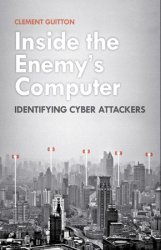
Автор: Clement Guitton
Название: Inside the Enemy's Computer: Identifying Cyber Attackers
Издательство: Oxford University Press
Год: 2017
ISBN: 978-0190699994
Язык: English
Формат: pdf
Размер: 15,3 mb
Страниц: 320
Attribution - tracing those responsible for a cyber attack - is of primary importance when classifying it as a criminal act, an act of war, or an act of terrorism. Three assumptions dominate current thinking: attribution is a technical problem; it is unsolvable; and it is unique. Approaching attribution as a problem forces us to consider it either as solved or unsolved. Yet attribution is far more nuanced, and is best approached as a process in constant flux, driven by judicial and political pressures. In the criminal context, courts must assess the guilt of criminals, mainly based on technical evidence. In the national security context, decision-makers must analyse unreliable and mainly non-technical information in order to identify an enemy of the state. Attribution in both contexts is political: in criminal cases, laws reflect society's prevailing norms and powers; in national security cases, attribution reflects a state's will to maintain, increase or assert its power. However, both processes differ on many levels. The constraints, which reflect common aspects of many other political issues, constitute the structure of the book: the need for judgement calls, the role of private companies, the standards of evidence, the role of time, and the plausible deniability of attacks
Acknowledgements ix
Introduction 1
1. Modelling Attribution 29
Attribution by the executive: a set of conditions for the model 31
Two attribution processes: characteristics and deployed resources 46
2. Reliance on Judgement 65
Attribution as an inescapable judgement call 67
Political implications: authority and trust 76
3. Standards of Proof 85
Domestic and international legal standards for attribution:
a mismatch 86
State sponsorship: malleable standards and misleading criteria 92
4. Private Companies 111
Three factors used to undermine companies’ credibility 113
A significant role on the international scene 124
5. Time 137
Measurable time: efforts to reduce it 138
Time in terms of context for national security incidents 151
6. Plausible Deniability 163
Sources of plausible deniability 164
Strategic considerations for warranting plausible deniability 173
Conclusion 183
Notes 201
Bibliography 255
Index 291
|